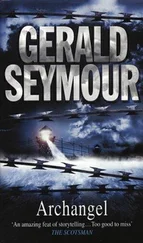“I have some idea,” she said. “What is it you think I do here?”
By now they had passed the Headquarters building, the place where she’d first sent him. Her feet were cold and she was hungry but he pinned her with his eyes, still talking. Dr. Hirschberg, he was saying, had no right to judge what had happened to him. It was true that after Mike had been killed he’d been angry at everyone, and would happily have shot the Brits who’d ordered the bombing, or the Russian pilots who’d made the mistake, but he and his friends had been glad to be sent from that place and the long hike to the east, which they knew had been meant to punish them, had actually been glorious. Cold, of course, twenty below zero, then forty below, so cold he couldn’t have imagined surviving ten days of it, but away from the fighting, away from the crowded, stifling, stinking billets, he’d been able to see, for the first time, what was beautiful about this country. Between the tiny villages ranks of pine and spruce stretched in all directions, marked only by twisting paths. He’d seen reindeer, and Russian Eskimos, and wolves; windmills, used for grinding grain, and weirs for trapping fish. Women crouched on the frozen river dunking clothes through holes in the ice while men, bulky and hairy as bears in their hooded parki , crossed paths with the actual bears, collared and chained, kept by the Russian soldiers as mascots.
She hadn’t left the city once. The surrounding country, flat and deadly, lacking the ridges and valleys of the land back home, was almost a blank to her. She imagined rivers in which the soldiers drowned, swamps that sucked at their legs, forests concealing their enemies. Railroads crossing the blankness and bringing them back to her. Her feet, she realized, were numb.
“We trapped rabbits,” Boyd said dreamily, as if he’d enchanted himself. Why hadn’t she pushed Dr. Hirschberg harder to consider his case? “We fished with grenades and shot deer and ducks and the little wild birds the peasants call rabchiks ; they make a good stew. One night we stayed in a monastery. Another in a village hidden so deep inside a ravine that we didn’t see it until we were in it. At noon the sun was just above the horizon, the rest of the day it was more like twilight, and we had to watch each other constantly for frozen ears and noses. But we were alone, just our two platoons. No British officers, no Russian troops to supervise. No one was shooting at us. We walked all day and ate good meals at night. We watched the sky. The northern lights here make a joke out of those back home, you must have seen them for yourself. Do you go out to watch them?”
“Sometimes,” Eudora said. “Not often, though — if I’m not working at night, I’m usually at a lecture, or in my room. I can’t …”
Odd, that he didn’t understand how impossible it was for her to move beyond the busiest and most public places at night. So many soldiers, from so many countries, and just the tiniest handful of non-Russian women in the city. He looked at her curiously but then started talking again, this time about his leg.
The long hike, he said, was the only time he’d been at peace since landing here, but it had also hurt his leg, inflamed it in some way he hadn’t understood until she’d examined him. First a little pain, which he thought had been caused by the weight of his pack, then something more constant and grinding. There’d been nothing to do but endure it. The medic at the tiny field hospital they’d established in a school gymnasium knew no more than he did and couldn’t do anything to ease his pain. He’d managed—“Vodka helps,” he said — but when he’d met Havlicek, whose pain was so much worse than his own, and who had lost all his friends, he’d felt an immediate bond.
“Couldn’t you have asked to be sent back to Archangel? Both of you, maybe?”
He snorted. “You don’t get to ask for things, in the Army. I didn’t choose to be here at all, although I guess you did.”
“I didn’t either, really,” she protested. “I was working in France, I was useful there. Then all of a sudden I got sent here.”
The sky had turned an unpleasant metallic shade and a fire flared in the distance, sending up a column of oily smoke. A cart passed, mounded with garbage. Two thin dogs trailed the cart, followed by more little boys — were they the ones who’d been at the toboggan run, or others? She had never seen so many children in the streets. Boyd called something to them in Russian that made them laugh, but when he turned back to her, his face was stern.
“I did try, you know,” he said. “To get Havlicek sent back. But the medic who first treated Havlicek took against me right away, maybe because I asked him to look at my own leg. And then I think he heard things about me from a couple of the officers. By the time I asked him to re-examine Havlicek and to put him on the sick list, the whole platoon I’d come east with was under suspicion. People had heard that we complained too much after Mike was blown up, and that we’d been sent to them only because the place was so far away, and because they needed some bodies to stick in front of the Bolos, and they figured we couldn’t contaminate anyone else out there. Anything any of us wanted, we got the opposite.” He laughed harshly. “I should have asked for Havlicek to be sent wherever the fighting was worst.”
They passed a shopwindow in which one small box of sugar sat like a crown on a purple cloth. She said, “But I thought Havlicek’s death was an accident.”
“Officially an accident, yes. But I didn’t think we were talking officially.”
Abashed, she shook her head.
“Then, well — I don’t guess it was an accident. But if it wasn’t, then someone could maybe have saved him. I might have saved him.”
She said, as she said to Dr. Hirschberg when he came out of the operating room bloody and pale, a sheet pulled over the face of whomever he’d worked on, “You did what you could. You tried.”
“So what?” By now they’d reached the pillars at the entrance to the hospital, and he looked broodingly across the courtyard. “I tried to get people to pay attention to what had happened to Mike, and to pull us out of that stupid place, and that didn’t work. I tried to help Havlicek and I failed at that too. That trip into the city — I stopped at a little farm, at the end of my first day, when it was too dark for the farmer to see the bundle on the sleigh. He gave me a place in the house near the stove and let the pony stay in the barn, but when I went out the next morning the whole family was already there, staring at Havlicek’s feet, which had come unwrapped somehow. They shooed me away and then the next night, when I stopped at a village, the people seemed to guess right away what was lying under the blankets. They made me leave the sled outside. The third night, I came into a village that was already in the midst of a wake. The men were drunk and when they saw the bundle they unloaded Havlicek without even asking me and carried him into the death house. They stretched him out on a bench next to a body that was already there and they told me I could sleep on the floor. By then I was so tired that I did. The next day I didn’t dare stop and so I kept passing all the villages and moving until it was too dark to see and then I got caught out overnight. I couldn’t stay warm. Finally I had to unwind one of the blankets from Havlicek’s body and wrap myself in it and burrow down into the hay next to him. That’s when I froze my fingers and my nose.”
She thought back to her first sight of him, hunched and silent, half dead with fatigue. “Why didn’t you let me help you?” she said. “Bring you into the hospital then — everything would have been different if you had. Dr. Hirschberg would have seen you frostbitten and hurt from your journey, and he would have taken care of you, he didn’t know anything about you then—”
Читать дальше












